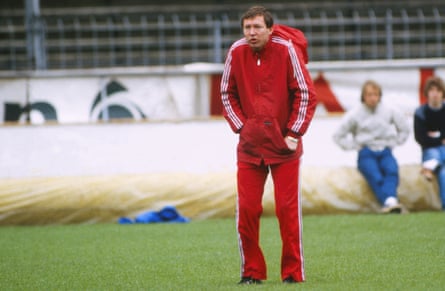40 Years Later: Aberdeen Rocks Real Madrid in Alex Ferguson's Memorable Night - The Guardian.

Players from Sir Alex Ferguson's notable Aberdeen side have reflected on what they describe as a "miracle" European cup win from 40 years ago ahead of Thursday's anniversary. Ferguson's 2-1 extra-time win against Real Madrid saw his fledgling Aberdeen team lift the Cup Winners’ Cup in 1983 and featured some players who were also part of his successful "Class of 92" at Manchester United, such as Paul Scholes, Ryan Giggs, David Beckham, Nicky Butt and the Neville brothers. However, it was the leadership of the then-fearsome Ferguson that was most pronounced. Striker Eric Black recalls Ferguson's demand for a "winning mentality" that pushed players to their limits: "He was incredibly demanding and he created an atmosphere that was semi-confrontational, within the players as well, to ensure we had that winning mentality and he got the last percentage out of everybody."
The importance of the win was further amplified by Real Madrid's continued success on the European stage. The Spanish side have played in 10 European competition finals since their loss to Aberdeen in Gothenburg in 1983 and Aberdeen’s youth - every player in the final was 28 or younger - makes the victory even more remarkable, including spectacular performances from the 20-year-old John Hewitt and 19-year-old Neale Cooper.
Some players would occasionally trigger Ferguson's wrath, such as when Hewitt overtook Ferguson on a snowy road and the rest made a gesture that angered the manager: "By the time we got back to the dressing room, he burst in and I got the: ‘You bloody maniac Hewitt! What do you think you’re doing?…He went on and on.” Even cup wins didn't guarantee praise. Ferguson slammed some players in a TV interview after they won the Scottish Cup final against Rangers, causing celebration to turn to unease: "That put a bit of a dampener on everything.”
Despite being tough, Ferguson's players were fiercely loyal to him. Much like his later tenure at Manchester United, he promoted youth at Aberdeen for two reasons: it was cost-effective and he could develop those players to create a winning mentality. "Sir Alex didn't allow anybody to linger on any success; once you'd achieved the aims, it was on to the next one," said Black.
What made Aberdeen's Cup Winners' Cup win remarkable was the strength of the teams they defeated, including Barcelona, Internazionale, Paris Saint-Germain, and Bayern Munich, all of which were stronger than Aberdeen themselves. "Bayern were laden with West Germany internationals - by far the best team we faced in the competition," said Hewitt.
But Aberdeen shocked Bayern, who had been in the previous season's European Cup final, in a way that would become familiar to Ferguson's later Manchester United teams. After a 0-0 draw in the first leg, Bayern led 1-0 then 2-1 in Scotland. However, Aberdeen scored twice in the final 15 minutes, with Hewitt scoring the winner. Aberdeen went on to win the Super Cup the following season and broke apart the Old Firm stranglehold at home. But people often ask why the quartet of youngsters who helped beat Europe's elite did not have a long-lasting career.
Black was forced to retire at 28 due to a persistent back injury. Hewitt, Simpson, and Cooper also struggled badly with injuries in their late 20s, leading to the end of their careers. Despite looking like the nucleus of a future Scotland team, only seven caps were earned by the four players put together (two by Black, five by Simpson).
Michael Crick's 2002 biography, "The Boss: The Many Sides of Alex Ferguson," suggests that the manager came to believe that he had pushed young players too hard early on. "There were players shattered at 25 and you have to ask yourself why," said Ferguson. "Maybe they had too much first-team football with all the pressure that brings."
Cooper, the team's holding midfielder, who resembled Ferguson and had a constant grin, said in 2016: "We were overplayed and Fergie admits that. I'm wrecked now and couldn't go for a run if I wanted. Playing golf the other day, I had to use a buggy but still ended up hurting my left knee...If you were slightly injured, you were scared to say because you'd be thought a jessie, so you played anyway."
Despite Cooper's passing in 2018 at age 54, his friends and former teammates believe that the positive impact of Ferguson's influence on their lives far outweighed the negatives. Black said that being overplayed at a young age did not contribute to his injury issues, stating that he "wouldn’t change it for anything...I certainly don’t blame anybody. It was what it was. And I was very fortunate to be a part of that Aberdeen team." Hewitt believes that it was more reflective of 80s attitudes towards rotation and managing workloads. "Nowadays it's all about sports science, diet, recovery."
Nevertheless, Ferguson's treatment of young players at Manchester United changed gradually. Although the likes of Giggs, Scholes, and Beckham were given responsibility at a young age, they were also rigorously protected from intense media attention and were closely monitored by the manager in terms of playing time. This may explain their longevity compared to their Aberdeen counterparts from ten years earlier. In conclusion, none of Ferguson's Aberdeen players regret being a part of that trophy-laden era, despite the injuries that cut their careers short.
When Ferguson first met Alfredo Di Stéfano, the Real legend and the club’s manager in 1983, he came armed with a bottle of whisky. Inspired by the legendary Jock Stein, then the Scotland manager, Ferguson presented it to Di Stéfano as a gift. “Let him feel important,” Stein advised, “as if you are thrilled just to be in the final.” Whether or not Di Stéfano knew Ferguson was acting starstruck while plotting his side’s downfall, he was generous after the match. “Aberdeen have what money can’t buy: a soul, a team spirit,” he said.
Hewitt reflects now that: “It was so nice to be part of a special group of boys, being managed by the best there’s ever been – it’s something I can’t fully explain. The city was buzzing back in the 80s, the fans were getting to cup finals every season, they were travelling in Europe – we the oil boom as well – so everything was blooming about the city. I was so proud to be a part of it.”
Aberdeen ’83: Once in a Lifetime is on BBC iPlayer from Thursday 11 May.




